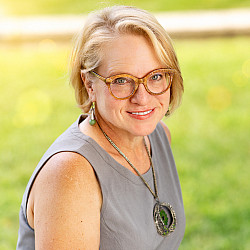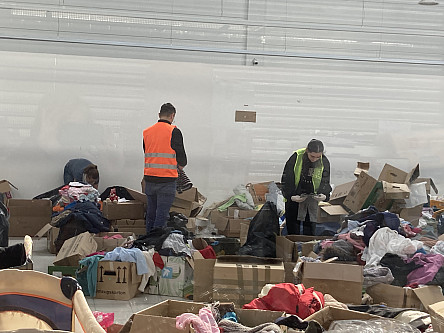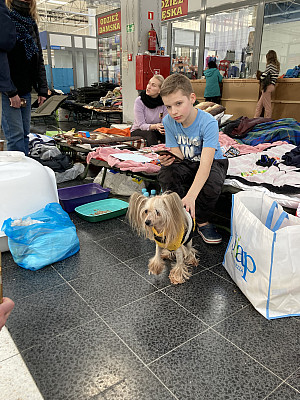Professor returns to Ukraine border, developing virtual tools for refugee aid
By Teresa Mackin
May 16, 2022
When the war in Ukraine started in February, Elizabeth Cullen Dunn knew she had to get there. In March, 10 days after the war started, she went to the Poland/Ukrainian border to help with the refugee response.

“My life’s work is to help refugees and to help create a system that works better for them, instead of trapping them in uncertainty,” said Dunn, a geography professor and director of the Center for Refugee Studies in the College of Arts and Sciences at IU Bloomington. “My research is focused on international humanitarian aid for refugees and displaced people, and I learn by doing, by being there and volunteering.
“We need to know what help is needed, and what help actually helps. I worked in Poland for years and speak Polish, so I felt I could be of help at that border.”
Dunn said the initial Ukraine refugee crisis response was unlike any she’d ever seen. Overwhelmingly, she said, it was private and not governmental. People were crowdsourcing, going to borders to help with their cars, bringing their supplies, organizing to send supplies into Ukraine. In later weeks and months, the Polish government was more involved.
“We saw 3 million refugees pass over that border in just the first six weeks of the war,” Dunn said. “Waiting to greet them were all self-organized volunteers. A group of people from the United Kingdom had come to offer Indian street food, there was a man from Texas who’d spent three weeks flipping pancakes for children, others were offering clothes and homemade sandwiches. The Ukrainians who passed through saw an enormous amount of support and hope.”

As the war goes on, Dunn said, there is still a huge need, and the need has changed. Over a million Ukrainians have gone back after fleeing the country, she said. Some are going back to their homes if they haven’t been destroyed. Many families can’t stay in Poland because they haven’t found housing. A lot of elderly people couldn’t leave Ukraine, so their family members are going back to take care of them. Millions are now displaced inside Ukraine, Dunn said.
“Things are much harder for refugees today,” Dunn said. “They’re older, sicker, poorer, and they’re coming from places like Mariupol or Kharkiv, where they’re dramatically more traumatized from what they’ve been through. There is a huge need still there to help; this is going to be an issue for years.
“The war is not over. It has been pulled back to the east, and what is happening there is brutal. ‘People to people’ aid chains are the lifelines keeping people alive. So we can’t give up now.”
Dunn is on her way back to the border, where she plans to stay for three weeks.
“During this visit, we will collect interviews with those who helped (amazing stories of those who gave millions in aid and volunteered their time), to talk about how it worked and what conditions were needed to get help across the border and into Ukraine,” she said. “Turns out, one of those things is local knowledge and funding streams.
“You need to have someone who knows how to move money and move goods. If you don’t have designated recipients, much of the help you provide is not going to be useful. You have to know exactly where that aid is going and what that person needs it for.”
Dunn’s research shows that donations without a designated recipient often go to waste. She said many of the donated clothing items in Korczowa, Poland, were left unused.

Dunn is working through the Center for Refugee Studies at IU to develop a model of volunteer-led aid, calling it “Distributed Humanitarianism.” She’s also developing tools to help people help others.
“These will be tools that individual volunteers can use to organize aid — things like virtual warehouses, where people who need things could place requests and fill them; or virtual transport centers, where people can post what they need and those who can get it to them can help. We want to look at the ways internet mediation can make things faster and safer.”
Dunn has also worked with refugees from Syria and the Republic of Georgia, along with other places. But she wasn’t always focused on refugee studies. A phone call on her way to the airport changed her life.
“I was focused on food and agriculture when I got a Fulbright to the Republic of Georgia. On my way to the airport, the phone rang. The U.S. Department of State was on the other line, telling me to get off the airplane if I was on one — that the Russians had invaded the Republic of Georgia and bombed the airport.
“That was August 8, 2008. If I’d gone there one day before, I would have been there that day.
“Three months later, I did make it to the Republic of Georgia, and spent 16 months in a camp for internally displaced people, just across the dividing line from the Russian 58th Army. It was shocking and terrifying. Sometimes the tanks were so close my tent would shake at night. But people in the camps were numb. They were not sure where to move, because the world was so uncertain for them. The Ukraine war now has brought this all back for them.”
How to help
Dunn said people can help Ukrainians by donating money to local Polish NGOs, the Kyiv School of Economics, which is organizing donor funds, or the organization For Peace. She said people also can simply start by being kind to others, right here at home.
“Simple kindness matters,” Dunn said. “People who’ve arrived here as refugees in the United States, wherever they’re from, have been through something intensely traumatic. It affects them and shapes them for the rest of their lives. Putting out a neighborly welcome to them changes everything.
“Person-to-person outreach, even spending time with someone whose English isn’t perfect — those things are tremendously helpful for someone who’s experienced things we can’t even imagine.”